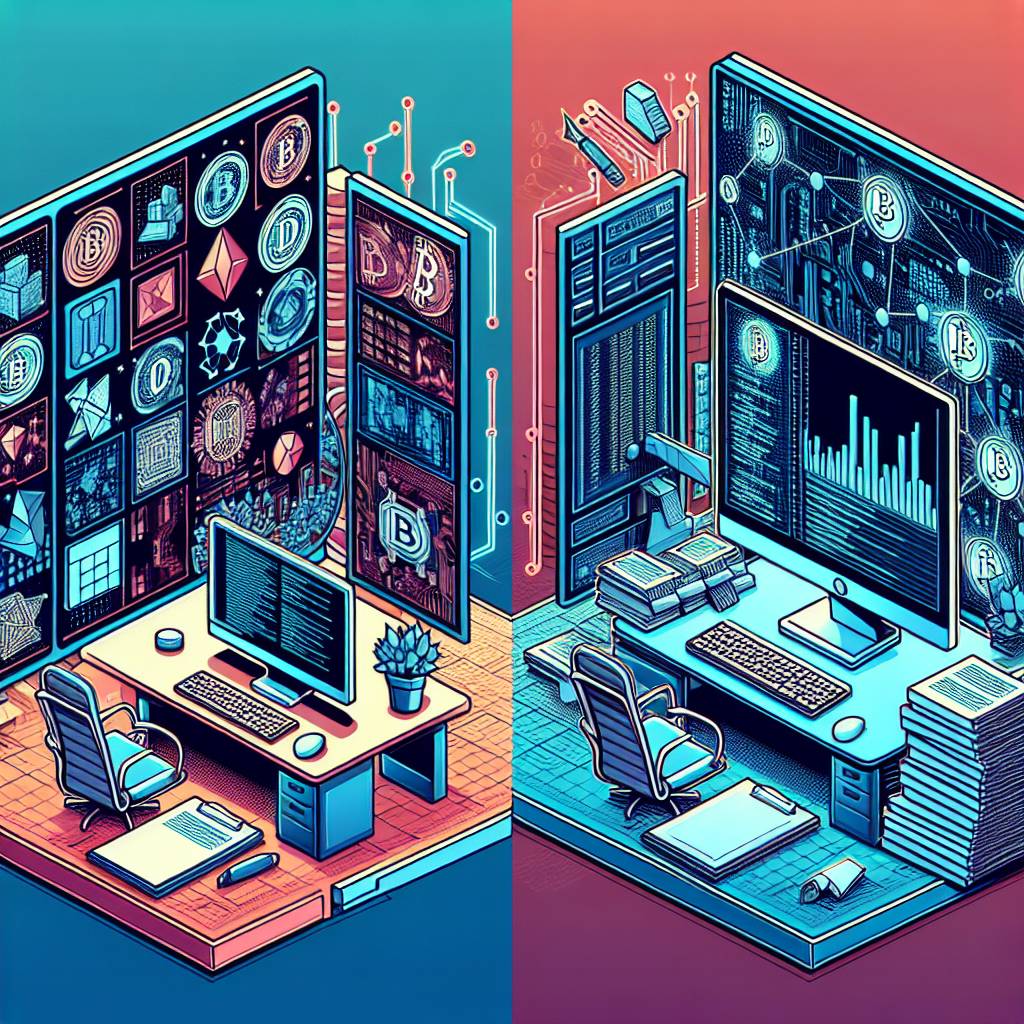How does coding for blockchain differ from traditional coding?
What are the key differences between coding for blockchain and traditional coding?

4 answers
- When it comes to coding for blockchain, there are several key differences compared to traditional coding. Firstly, blockchain coding often involves the use of smart contracts, which are self-executing contracts with the terms of the agreement directly written into code. This requires a solid understanding of blockchain platforms like Ethereum and programming languages like Solidity. Traditional coding, on the other hand, is more focused on building applications and websites using languages like Python, Java, or JavaScript. Another difference is the decentralized nature of blockchain coding. In traditional coding, developers usually work on centralized systems where data is stored in a single location. In blockchain coding, data is distributed across a network of computers, making it more secure and resistant to tampering. This requires developers to consider factors like consensus algorithms and network protocols when coding for blockchain. Lastly, blockchain coding often involves working with cryptocurrencies and digital assets. Developers need to understand how to interact with blockchain networks, handle transactions, and ensure the security of user funds. This adds an extra layer of complexity compared to traditional coding, where financial considerations are usually not a primary concern. Overall, coding for blockchain requires a specialized skill set and a deep understanding of blockchain technology, smart contracts, decentralized networks, and cryptocurrencies.
 Dec 27, 2021 · 3 years ago
Dec 27, 2021 · 3 years ago - Coding for blockchain is like entering a whole new world of programming. It's not just about writing code, but also understanding the underlying principles of blockchain technology. Unlike traditional coding, blockchain coding involves working with decentralized networks, smart contracts, and cryptocurrencies. It requires a different mindset and skill set. In traditional coding, you might be building applications or websites using popular programming languages like Python or JavaScript. But in blockchain coding, you'll need to learn languages like Solidity, which is specifically designed for writing smart contracts on platforms like Ethereum. Another major difference is the concept of decentralization. In traditional coding, data is usually stored in a central server or database. But in blockchain coding, data is distributed across a network of computers, making it more secure and transparent. This decentralized nature requires developers to think about consensus algorithms, network protocols, and data integrity. Lastly, blockchain coding often involves working with cryptocurrencies. You'll need to understand how to interact with blockchain networks, handle transactions, and ensure the security of digital assets. It's a whole new level of complexity that traditional coding doesn't typically involve. So, if you're thinking about diving into blockchain coding, be prepared for a different coding experience. It's exciting, challenging, and full of opportunities.
 Dec 27, 2021 · 3 years ago
Dec 27, 2021 · 3 years ago - Coding for blockchain is a unique experience that differs from traditional coding in several ways. As a developer at BYDFi, a leading cryptocurrency exchange, I've had the chance to work on blockchain projects and witness the differences firsthand. One key difference is the use of smart contracts. In blockchain coding, smart contracts are essential for executing transactions and enforcing agreements. These contracts are written in languages like Solidity and are stored on the blockchain itself. Traditional coding rarely involves such self-executing contracts. Another difference is the decentralized nature of blockchain coding. Instead of relying on a central authority, blockchain networks are distributed across multiple nodes. This requires developers to consider factors like consensus algorithms and network security when coding for blockchain. Lastly, blockchain coding often involves working with cryptocurrencies. Developers need to understand how to interact with blockchain networks, handle digital assets, and ensure the security of user funds. This adds an extra layer of complexity compared to traditional coding, where financial considerations are usually not a primary concern. In summary, coding for blockchain requires a deep understanding of smart contracts, decentralized networks, and cryptocurrencies. It's a fascinating field that offers unique challenges and opportunities for developers.
 Dec 27, 2021 · 3 years ago
Dec 27, 2021 · 3 years ago - When it comes to coding for blockchain, there are several key differences compared to traditional coding. Firstly, blockchain coding often involves the use of smart contracts, which are self-executing contracts with the terms of the agreement directly written into code. This requires a solid understanding of blockchain platforms like Ethereum and programming languages like Solidity. Traditional coding, on the other hand, is more focused on building applications and websites using languages like Python, Java, or JavaScript. Another difference is the decentralized nature of blockchain coding. In traditional coding, developers usually work on centralized systems where data is stored in a single location. In blockchain coding, data is distributed across a network of computers, making it more secure and resistant to tampering. This requires developers to consider factors like consensus algorithms and network protocols when coding for blockchain. Lastly, blockchain coding often involves working with cryptocurrencies and digital assets. Developers need to understand how to interact with blockchain networks, handle transactions, and ensure the security of user funds. This adds an extra layer of complexity compared to traditional coding, where financial considerations are usually not a primary concern. Overall, coding for blockchain requires a specialized skill set and a deep understanding of blockchain technology, smart contracts, decentralized networks, and cryptocurrencies.
 Dec 27, 2021 · 3 years ago
Dec 27, 2021 · 3 years ago
Related Tags
Hot Questions
- 98
Are there any special tax rules for crypto investors?
- 98
What is the future of blockchain technology?
- 85
What are the best practices for reporting cryptocurrency on my taxes?
- 83
How can I protect my digital assets from hackers?
- 74
How can I buy Bitcoin with a credit card?
- 73
What are the advantages of using cryptocurrency for online transactions?
- 57
What are the best digital currencies to invest in right now?
- 55
How can I minimize my tax liability when dealing with cryptocurrencies?
